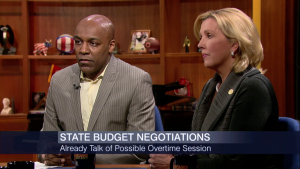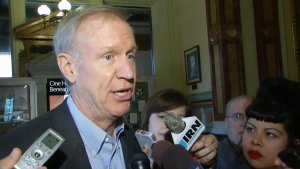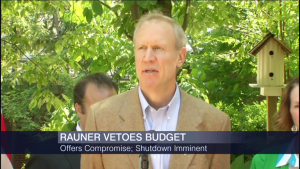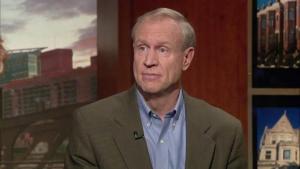http://chicagotonight.wttw.com/2015/10/07/governor-rauner-ups-heat-democrats
Illinois is now more than four months into its fiscal year without a state budget, and today Gov. Bruce Rauner said enough is enough. He urged Democrats to get on board with a set of reforms that he is pushing in exchange for a tax increase that he says they want. But will his latest appeal move his opponents to sit down and talk?
 The governor is pressuring the legislature by using the bully pulpit, giving a speech, and doubling down on some of the more controversial elements of his so-called turnaround agenda that includes the call to curb collective bargaining rights for public employees as well as allow governments to competitively bid on construction projects to bring down costs. He made these remarks today before a south suburban convention and visitor’s bureau, saying a budget agreement would remain elusive without those collective bargaining agreement reforms and other reforms like term limits and an end to gerrymandered legislative districts.
The governor is pressuring the legislature by using the bully pulpit, giving a speech, and doubling down on some of the more controversial elements of his so-called turnaround agenda that includes the call to curb collective bargaining rights for public employees as well as allow governments to competitively bid on construction projects to bring down costs. He made these remarks today before a south suburban convention and visitor’s bureau, saying a budget agreement would remain elusive without those collective bargaining agreement reforms and other reforms like term limits and an end to gerrymandered legislative districts.
He repeated his contention that he’s open to higher taxes, but issued this ultimatum to House Speaker Michael Madigan and Illinois Democrats.
“Join us in passing structural reforms and a balanced budget or continue to block structural reforms, including term limits and fair maps,” Rauner said. “But if you block reforms, than use your supermajority to pass your own tax increase to pay for the spending level that you want. But please choose now. Time’s up.”
The governor also called for legislators to pass pension reform that he says could save a billion dollars by using the Illinois Senate President John Cullerton blueprint offering employees and retirees a choice: have a lower pensionable salary or keep your cost of living raise. We don’t know if that’s constitutional, and other Republicans told “Chicago Tonight” that there is no bill filed to deal with this.
![]()
I implore the Democrat leaders to take up the governor’s offer of sitting down and negotiating this budget.
–Illinois House Minority Leader Jim Durkin
The union issues are precisely what the Democrats say they will not support that they will not compromise on. So why is the governor doubling down on it?
The governor says that’s the only place the state’s going to be able to make structural reform and get significant savings—billions of dollars’ worth. Rauner says construction projects at the local government level are often more expensive in Illinois because of labor agreements that mandate higher wages than normal, and collective bargaining should be curbed, if not altogether eliminated for public employees.
“Illinois is unusual in our position on these issues. Across America, 33 states limit all or a portion of collective bargaining in state or local governments. That is the norm. That is not a radical idea. Many of those 33 states are controlled by Democrats.”
After his speech, Rauner immediately ducked out of a backdoor and drove away in his SUV convoy, evading any reporter’s follow up questions. He’s very infrequently granted questions from the Chicago media, but he did arrange for the top republicans in the house and the senate to answer questions instead. They agreed collective bargaining reforms were necessary for a budget deal, and they also say that a deal won’t necessarily come in Springfield.
“We have to negotiate. We have to provide a framework to get this done. We can do that anywhere. We don’t need to be in Springfield to do that. We can do it here in Chicago, and I implore the Democrat leaders to take up the governor’s offer of sitting down and negotiating this budget,” Illinois House Minority Leader Jim Durkin said.
“The fact that Illinois has become so much an outlier in how we handle our public employees has caused our property taxes to be several times that of other states,” said Illinois Senate Minority Leader Christine Radogno. “People know they can buy the same type of property in a different state and have property taxes that are only 20 percent of what they’re paying here. A lot of that comes back to the local control over bargaining and also the number of units of local government that we have.”
The governor’s speech didn’t seem to have an effect on the state’s most powerful Democrat, House Speaker Michael Madigan, who almost immediately after the speech issued the following statement:
“There is no question all of the disruption caused by the current impasse is due to the Governor’s decision to veto the spending plan approved by the legislature. I’ve stated all year that I will work with the governor cooperatively and professionally, but we will not devastate Illinois’ middle class and struggling families by furthering an agenda aimed at driving down their wages and their standard of living.”
The governor’s also reduced spending on state subsidized child care for low-income parents—90 percent fewer parents can apply or qualify for this service. This was the subject of hearings downtown where people were pleading for the governor to restore that spending.
Ninety percent of state spending is still happening because court orders have determined that they should happen without a budget. The state is not taking in nearly enough money to pay those bills, the deficit is growing larger, and the House and Senate are not scheduled to be back in Springfield for another two weeks.
More ‘Chicago Tonight’ stories on the state budget
 Rauner Slashes Social Services
Rauner Slashes Social Services
For nearly half of Gov. Bruce Rauner’s term, Illinois has been without a budget. Rauner argues the budget impasse constitutes a state of emergency, which is his rationale for using an obscure rule-making procedure to cut spending and set up stricter eligibility requirements for social services. Amanda Vinicky joined us to discuss the governor’s plans.
 ‘Rebel’ Lawmakers on Political Impasse
‘Rebel’ Lawmakers on Political Impasse
As summer turns to fall, time seems to be at a standstill in Springfield. With the House not scheduled to meet anytime soon, is now the time for state lawmakers to break ranks and come up with a plan B? And if so, what practical options do they have? We talk with a group of so-called rebel lawmakers.
 Gov. Rauner Unveils His Budget
Gov. Rauner Unveils His Budget
In February, the governor unveiled his budget for fiscal year 2016, which included proposed spending cuts as well as reforms. The day after Rauner’s budget was released, Carol Marin discussed his priorities and the likelihood of the Democratically controlled General Assembly supporting him with Diana Rickert, Madeleine Doubek and Ralph Martire. Revisit our conversation and listen to legislative leaders’ initial reactions to Rauner’s proposed budget.
 Lawmakers on 2016 Budget Negotiations
Lawmakers on 2016 Budget Negotiations
In late March, the Illinois Legislature passed a stopgap budget fix to plug a $1.6 billion deficit and avoid running out of money before the end of Fiscal Year 2015. Carol Marin spoke with Sens. Kwame Raoul and Sue Rezin about the legislators’ work refining the proposed budget by Rauner.
 Springfield News with Amanda Vinicky
Springfield News with Amanda Vinicky
In May, “Chicago Tonight” Springfield reporter Amanda Vinicky updated us on the budget proposal unveiled by House Speaker Michael Madigan that’s at least $3 billion short.
 Budget Battle Rages on in Springfield
Budget Battle Rages on in Springfield
Gov. Bruce Rauner and Democratic lawmakers were unable to agree on a budget plan for the state by the deadline for the spring legislative session. Powerful House Speaker Michael Madigan said his chamber plans to be in “continuous session” this summer to address the state’s $6 billion budget shortfall.
 Gov. Rauner Vetoes Budget Bills
Gov. Rauner Vetoes Budget Bills
Lawmakers and the governor are now back to square one on the state budget, just five days before a potential state government shutdown. Gov. Bruce Rauner vetoed all but the education portion of the budget sent to him by the General Assembly, saying it was $4 billion out of whack. The governor’s veto came on June 25, just days before the beginning of fiscal year 2016.







